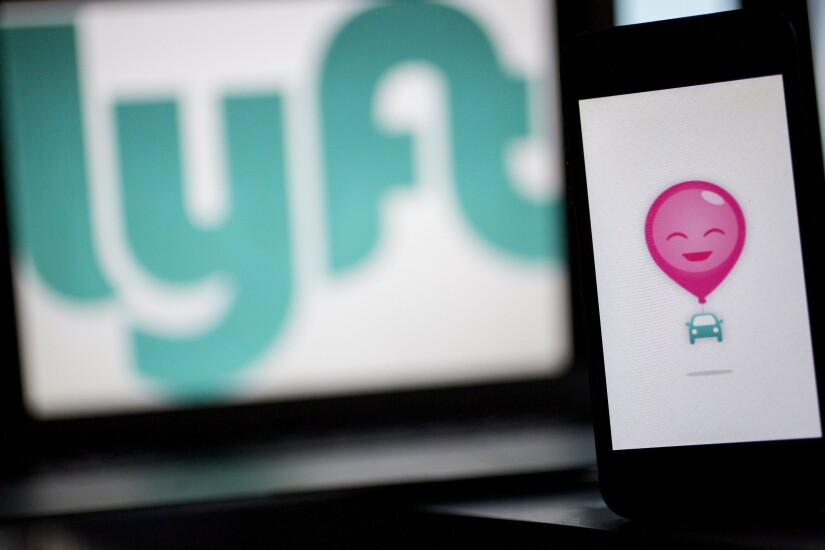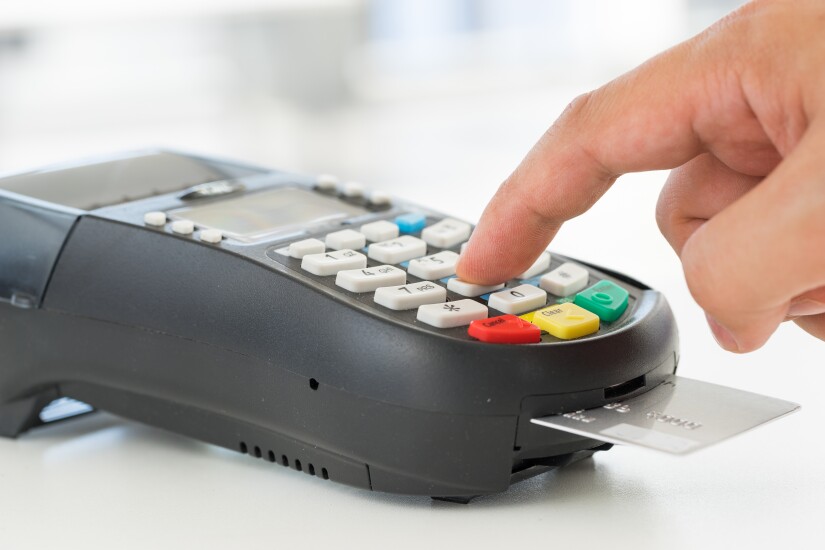

Built-in credit card
The in-app money management features harken to the ambitions the ride-sharing company
“What we’re working on, I don’t even want to call it a wallet,” said Brian Crist, chief payments counsel for Uber Technologies, at PayThink. “One thing that we continue to look at is trip experience … could you pay for a restaurant, for example? Could you pay for your theater tickets through the experience?”
The card's rewards structure are in line with that philosophy. Like many cards targeting middle-market consumers, the Uber Visa card has no annual fee, and rewards vary based on the merchandise category, emphasizing activities most popular with Uber riders.

Fueling faster payments
From the consumer’s perspective, the most important task for
But drivers need cash right away to cover their own costs, including gas while they are still on the road.
“There is a compelling need today to solve this. We are faced with it on a day to day basis and we have been faced with it for years,” said Ashwin Raj, Lyft’s vice president of payments, in a presentation at SourceMedia’s annual PayThink event.
“My driver who needs to pay for his gas to provide the next drive cannot wait for Same Day ACH. They need those funds immediately,” he said.
For them, the best option is Express Pay, Lyft’s branded version of Visa Direct and Mastercard Moneysend, which operates via debit card transactions. Express Pay “has become such a significant part of our services that the majority of our drivers are using it” to receive funds within 30 minutes, Raj said.
“It’s a good story so far, but there is a ‘but,’” he said.
Express Pay works only for drivers who enroll a debit card, rather than a prepaid card or a bank account number. There is no near-real-time option for drivers who do not have or do not want to use a debit card; for them, the best option is standard ACH.
“We can’t say to a driver, ‘You have to put in a certain instrument to get your funds,’” Raj said. “That is the problem we’re trying to solve for.”

The global gig
"When you look at domestic transactions, that's fairly easy and you have a bunch of options to choose from," said Likar, vice president of strategy and business development at Hyperwallet, which serves companies in the sharing or "gig" economy.
Such companies include freelancers, contractors and app-based workers such as Uber and Lyft drivers. The San Francisco-based mass payout company has traditionally focused on North American payers, but has recently opened offices in London and Sydney, with plans to shortly add an Asian office, to address what Likar said are expanding needs for international mass payments. Hyperwallet has clients that have expanded into as many as 30 new markets in the past year, Likar said.
The sharing economy is complex enough in one market, but international sourcing adds new challenges. "Once you get into country three or four or five, you have to open a new a bank account in each. It can get complicated," Likar said.
Even in a domestic market such as the U.S., which has the ACH system for fast electronic transfers, about

Flirting with blockchain
The San Francisco company, which allows people to rent spare rooms in their homes to travelers, acquihired a team of bitcoin and blockchain experts from the micropayments startup ChangeCoin last year.
App companies like
"We are thrilled to bring some members of the ChangeTip team on as a part of Airbnb," the spokeswoman said. "We are not acquiring the assets of the company, nor do we have any plans to incorporate bitcoin into the AirBnB ecosystem."

Reality check for Apple Pay, Android Pay
“There’s been a strategic error on the part of … the ‘Pays’ — whether it’s Android or Samsung or Apple — in some ways, in marketing the physical point of sale ‘Gee whiz, tap your phone’ aspect of the wallet, when in reality that’s not the thing that’s broken,” said Brian Crist, chief payments counsel for Uber Technologies, at SourceMedia’s annual PayThink conference.
The various wallets don’t advertise their interoperability with other payment methods, even though merchants and issuers know they play nice with one another — how is a consumer to know Visa Checkout accepts non-Visa cards, Crist asks. This issue could easily mislead consumers into thinking they can’t complete a purchase without going to a different merchant, he said.
“In creating this brand differentiation, they’re actually obscuring the fact that there are standards underpinning this stuff,” Crist said. “That’s why the existing incumbents that have your card on file like Amazon still kill it in the mobile space.”
The situation is similar at Lyft, which views the payment as a point of friction even though it happens far below the surface of the user interaction.
There are three points of friction to requesting a Lyft ride for the first time, according to Ashwin Raj, Lyft’s vice president of payments, who also spoke at PayThink. Those pain points are downloading the app, setting up an account and adding a payment card.
On the mobile device, adding a payment card is tedious enough that if the user has other options, he or she may opt for an alternative rather than update the card and request a Lyft, he said.
“It becomes a point of friction, not only on the first time,” because eventually the card on file might expire or get canceled, Raj said. And the user will only be prompted to update the card when requesting a ride. “You’re not sitting there on a Sunday evening thinking, ‘I’m going to update my Lyft card,’ ” he said.
Apple Pay would seem to solve that problem by using the card on file with Apple, but the trade-off is in shifting the customer relationship to Apple, thus depriving Lyft of other data that it can use to determine the rider’s ability to pay.
“We don’t have a direct relationship at that point with that customer who’s signing on using Apple Pay,” Raj said. “All we know is a token, at that point. That is less preferable.”

Doing more with debit
Leveraging its
Unlike many corporate disbursement methods that rely on ACH, the new offering drives instant “push” payments across a broad range of debit networks through a single connection, and it also works with First Data’s Money Network-branded prepaid card.
First Data’s new product also expands options and may reduce costs for companies looking for ways to support higher volumes of payments, such as ride-sharing companies.
Lyft, for example,
“The digitization of commerce has caused consumers, including tech-minded individuals working in the gig economy, to expect convenience in every interaction,” said Ashish Bahl, head of global debit solutions at First Data, in the release.
Bahl previously was CEO of Acculynk, which developed the PaySecure online PIN debit service, Payzur P-to-P payments and electronic payments for municipalities. Acculynk enabled users to accept Visa and Mastercard transactions and





